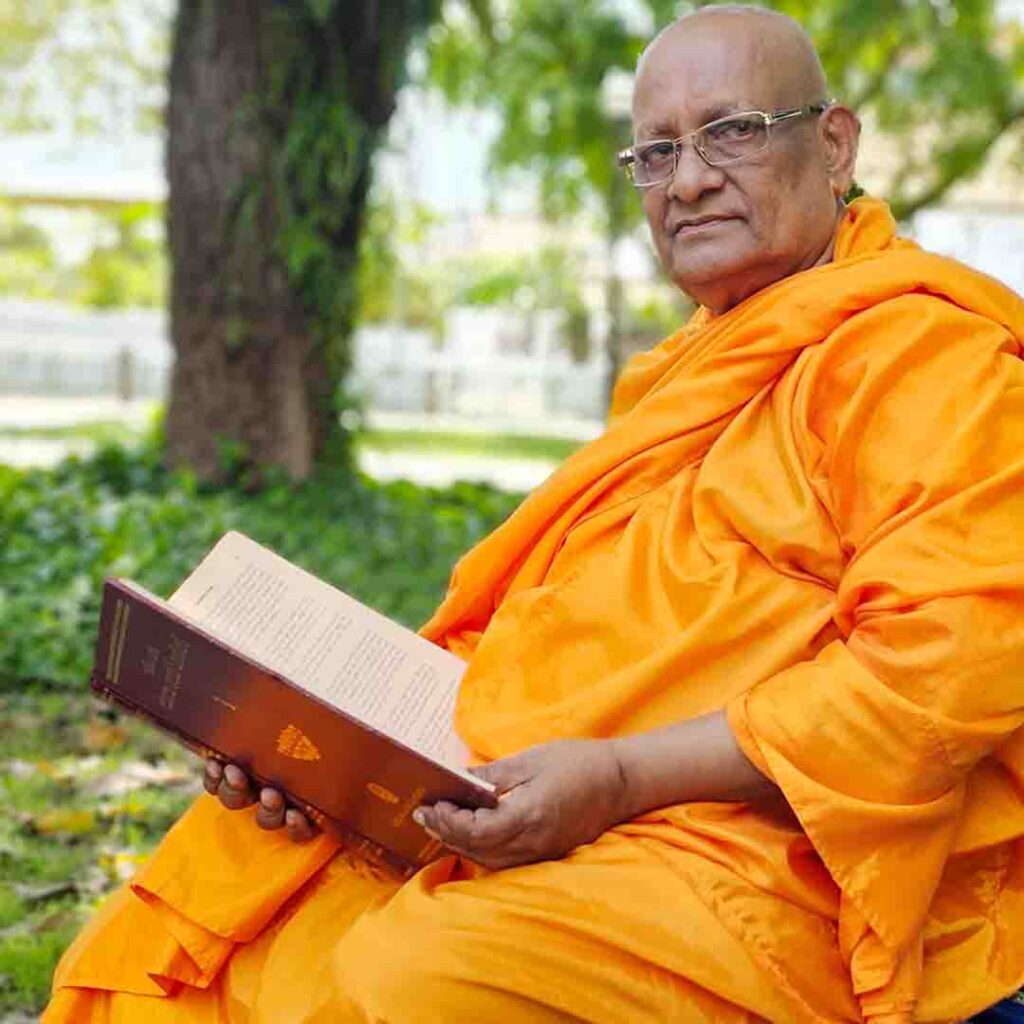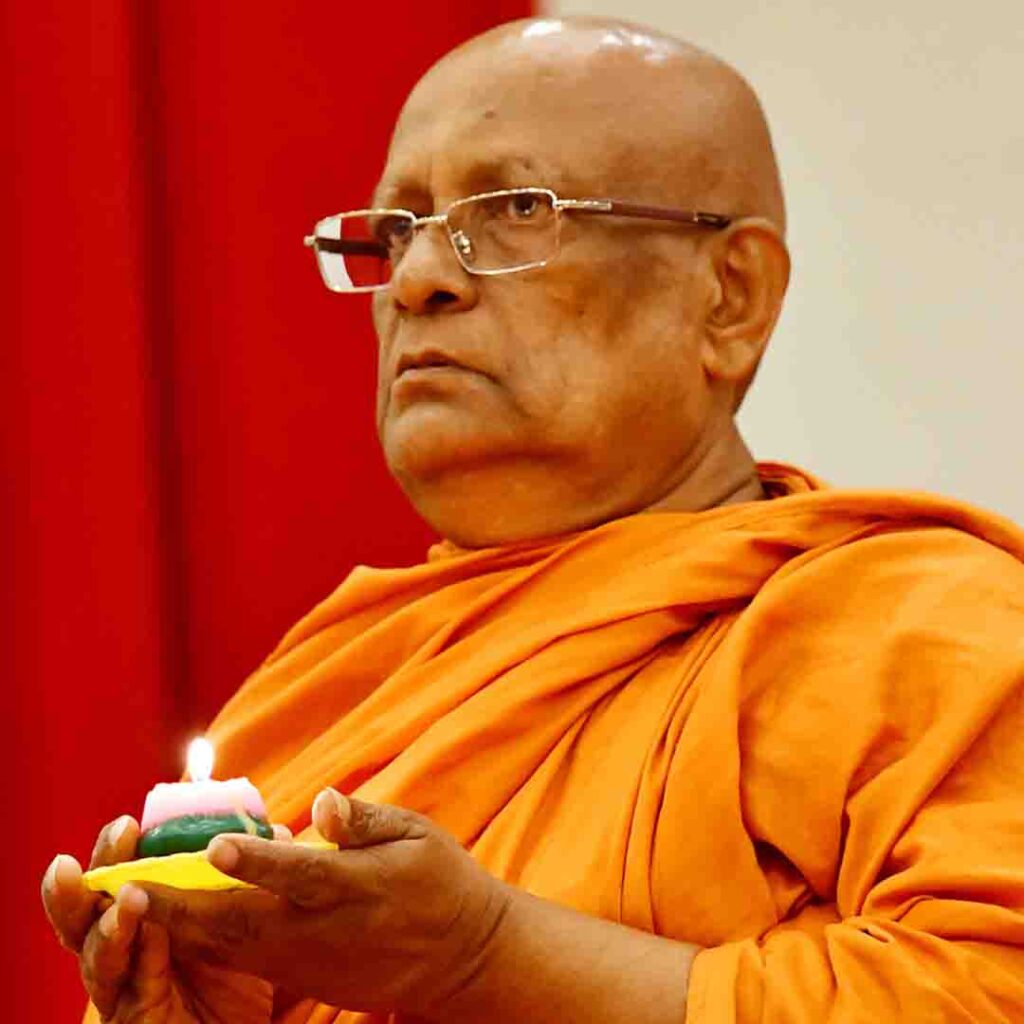Meditation Articles
The way to happiness through admirable friend, Kalyana Mitta
Most Venerable Dr. Galle Udita Maha Nayake Thero
The Chief Sangha Nayake of Singapore & Malaysia, Senior Religious Adviser of Buddha Vihara Society, “Sihapura Sanghapati”
“Asevanaa Ca Balaanang – Panditaanang Ca Sevanaa – Pujaa Ca Pujaniyaanang – Etang Mangala Muttamang”
Not to associate with the foolish but to associate with the wise is a factor of welfare. Evil friend is called Paapamitta and the good friend is called Kalyana Mitta in Pali language. The features of Paaapamitta are having the corrupted physical, verbal and mental actions in his behaviour. Those actions are not only harmful to oneself but also to many others.
One who takes the life of another cannot live longer and lives short life every time he is born. He is also subjected to be killed for many times in the journey of life circle. One who steals would have to suffer in many rebirths being very poor. Others rob him too as repercussion of Karma. Verbal misdeeds are resulted as unfaithful to others, deformed mouth and sufferings in the hell etc. Mental deforms, madness, retarded nature are the results of wrong thoughts.
The opposite of Paapamitta namly Kalyana Mitta is somewhat different from normal friend. Sigalovada Sutta, the sermon on the discipline of the layman says that there are four good friends such as Upakaraka, Anukampaka, Samaana Sukha Dukkha and Atthakkhayi. Upakaraka Mittta points out correct path, protects the wealth of the friend, protects the friend, gives more than what friends need. Anukampaka Mitta is not happy with the misfortune of the friend, happy with the prosperity of the friend, he prevents ill talks of others about the friend, praises of those who talk good of the friend. Samana-sukha-dukkha tells his secrets to his good friend, he keeps the secrets of the friend, he does not forsake his friend when in trouble, he would even lay down his life for his friend. Atthakkhayi friend restrains his friend from doing wrong, he enjoins his friend to do right, he informs his friend what he has not heard before, he reveals the way to a heavenly state to his friend.
Once Venerable Ananda told the Buddha that half of Buddhism depends on the good companionship, then Buddha told him not the half but whole Buddhism depends on noble friendship of Kalyanamitta because he guides his friend to a better path, the way to knowledge, the way to heaven, etc.
The four Papamittas known as Anyadatthuhara, (A rapacious person) Apaayasahaya, (a fellow wester) Vaciparama (a man of lip service) and Anuppiyabhani ( a flatter) are not beneficial but misleading.
The first Anyadatthuhara takes away what he can takes from his friend, he gives little and ask much, he does his duty out of fear, he pursues his own interest. Apaayashaaya the fake friend accompanies his friend for vices such as drinking, gambling etc., he accompanies him to wander in the streets at untimely hours, he accompanies him to frequent shows, he accompanies him for gambling.
Vaciparama the fake friend speaks words of the past, words of the future, useless words and his inability to help when his friend needs. The fake friend Anuppiyabhani agrees to wrong deeds, does not agree to good deeds, speaks good of the friend in front of him and speaks bad of the friend in the absence of the friend.
In the time of Lord Kassapa Buddha then Bodhisattva, present Sakyamuni Lord Buddha was born in a Brahmin family of heretic religion and he had a Buddhist friend namely Ghatikara, a potter. The good friend Ghatikara thought of taking his friend Jotipala a Brahmin’s son to visit the Lord Kassapa Buddha but his friend Ghatikara did not agree to visit the Buddha. Then Ghatikara invited him to go to the river for a shower and both of them swam in the water for taking a bath. In the meantime, Ghatikara asked him to join with him to see the Buddha, then the friend Jotipala refused it again and again when he asked for a thrice. Ghatikala became very rough and pushed his head to water taking him from his hair and ordered him to visit the Buddha. Jotipala thought his good friend has never forced him such a way before to do anything, his intention should be for my best welfare. Definitely he would not force me to do something harmful to me. Then he agreed to company with him to see the Buddha. Finally, both of them went to see the Lord Kassapa Buddha and listened to the doctrine that He delivered to them. Upon hearing the sublime Dhamma Jotipala was happy and was converted to Buddhism. He became even a disciple of the Lord Kassapa Buddha. Ghatikara was happy for what he has advised to his good friend.
According to this past story of present Buddha anyone may go wrong in the journey of life circle but if one might associate an admirable friend he would guide him for the proper path like Ghatikara had done to Jotipala. A good friend guides his friend to be good by hook or crook. English statement says “friend in need is friend indeed” Some people say that one does not have a friend is a death of a person in the absence of evidences.
Buddha advised Brahmin Vayaggapajjha that four conditions lead to a successful life in this very life namely Utthana Sampada, Arakkha Sampada, Kalyana Mittata and Samajivikata. That means acquisition of endeavour, acquisition of protection, admirable friendship and balanced livelihood etc. are the four conditions for the welfare of the individual in this very life. Hence, good friendship is very important for an individual to achieve a successful life.
All disciples of the Buddha have heard the Dhamma either from the Lord Buddha directly or from another enlightened disciple for their spiritual achievements. They are the Kalyana Mittas, the admirable friends or spiritual friends. In brief confidence, morality, charity, wisdom are virtues of an admirable friend.
The happiness here and hear after mainly depends on the association of Kalyaanamitta. Let us choose a good friend for our own welfare. May all beings be well and happy!!
How to escape from disturbances of spirits and demons
The Heaven of four divine kings known as Catummaharajika is one the of six heavens in Buddhism. Divine king of the eastern direction known as Dhatarattha is the leader of Gandhabbas (divine musicians). Divine king Virulha of the western direction is the leader of Kumbhandanas (spirits) The leader of Nagas (semi divine beings), Virupakkha is the in charge of southern direction and the Wessavana the in charge of the north is the leader of Yakkas (demons). These four divine kings once visited the Buddha when he was residing on the Gijjhakutha mountain in Rajagaha. The divine King Vessavana told Buddha to inform Buddhist followers to be careful from disturbances of demons.
He told Buddha that among higher, middle and lower demons, some are not happy and some are happy with the Buddha. Mostly demons are not happy with Buddha because the Buddha advices the disciples to not to kill, not to steal, not to indulge in sexual misconduct, not to lie and not to drink liquor etc. Then the divine king Vessavana says,
Bhagava’hi Bhante, (Blessed one the Venerable)
“Panaati Paataa Veramaniyaa Dhammang Deseti
(Delivers Dhamma to prevent from killing living beings)
Adinnaadaanaa Veramaniyaa Dhammang Desiti
(Prevent from stealing)
Kaamesu Micchacaaraa Veramaniyaa Dhammang Deseti
(Prevent from sexual misconduct)
Musaavadaa Veramaniyaa Dhammang Deseti
(prevent from lying)
Suraa Meraya Majja-pamaadatthaanaa Veramaniyaa Dhammang Deseti”
(Prevent from drinking liquor that makes people drunk and heedlessness)
Vessavana the divine king of demons told the Buddha the sutra known as Aataanaatiya for the protection of those disciples that residing in the deep forest for their cultivation of meditation. The Atanatiya Sutra deals with the verses to pay homage to the seven Lord Buddhas for the protection as follows.
“Vipassisa Namatthu – Cakkhumantassa sirImato
Sikhissapi Namatthu – Sabba Bhutaanu kampino”
Let there be the honour to the Lord Vipassi Buddha endowed with wisdom eye. Let there be the honour to the Lord Sikhi Buddha who is kind to all beings.
“Vessabhussa Namatthu – Nahaatakassa tapassino
Namatthu Katkusandhassa – Maarasenaapaddino”
Let there be the honour to the Lord Vessabhu Buddha who is free from all defilements endowed with the endeavour of burning defilements. Let there be the honour to the Lord of Kakusanda Buddha who has defeated the retinue of the Mara.
“Konagamanassa Namatthu – Brahmanassa Vusimato
Kassapassa namatthu – Vippamutassa Sabbadhi”
Let there be the honour to the Lord Konagama Buddha who has cast away all evils and completed sublime celibacy, the enlightened path of noble conduct. Let there be the honour to the Lord Kassapa Buddha who is especially free from all defilements.
“Angirasassa Namatthu – Sakyaputtassa Sirimato
Yo imang Dhammamadesesi – Sabbadukkhaapanudanang”
Let there be the honour to omniscient, the Lord Gautama the Sakiyaputta who has revealed the doctrine of eliminating all sufferings
“Ye Caapi Nibbutaa Loke – Yathaa Bhutang Vipassisung
Te Janaa Apisunaa – Mahantaa Vitasaradaa”
Let there be the honour to those Arahants in the world who are free from the fear of life circle, that have attained the tranquility, that are endowed with insight of realities, that are free from harmful words such as slandering etc and who have attained the greatness in virtues.
“Hitang Devamanussaanang – Yang Namassanti Gotamang
Vijjaa Carana Sampannang – Mahantang Vitasaaradang”
Let there be the honour to the Lord of Gotama the Buddha who is endowed with knowledge and conducting virtues, who has attained the greatness, who is free from fear, who is benevolent to the gods and men, Let there be honour to the Lord Buddhas in the past, present and the future.
Divine king Vessavana told Lord Buddha again that the retinues of four divine kings Nagas, Kumbandas, Gandabbas and Yakkas are used to respect Sakyamuni Buddha when they see Him far away. Nevertheless, there are some demons who don’t obey to the great divine kings, the guardians of four directions but those that disturb the devoted Buddhist disciples would be punished.
Those who were disturbed by the demons have to inform to the responsible demons with loud voice that this demon takes me, this demon possesses me, this demon disturbs me, this demon severely disturbs me etc. (Ayang Yakkho Ganhaati, Ayang Yakkho Avisati, Ayang Yakkho Hetheti, Ayang Yakkho Vihetheti.)
The following is the list of names of the demon ministers recorded in Atanatiya Sutra to whom call upon to complain.
Indo, Somo, Varuna, Bharadavaja, Pajapati, Candano, Kamasettha, Hirinetti, Mandiyo, Cittaseno, Gandhabba, Naloraja, Janesabho, Saataagiro, Hemavato, Pajjunno, Sumano, Dadimukha, Manimanicaro, Serissako,
As demons that are against the teachings of the Buddha there are people also among us that hate the Buddha and his teachings. Therefore, Paraabhava Sutta says,
“Suvijaano Bhavang Hoti – Suvijaano Paraabhavo
Dhammakaamo Bhavang Hoti – Dhamma Dessi Paraabhavo”
It is easy to know the people who can achieve progress and easy to know who lose their progress and go to the downfall. Those who like the doctrine of the Buddha improve themselves, achieve success and those who hate the doctrine decline themselves and go to the downfall in progress and success,
Those who deny the truth that is verifiable are really ignorant. Ignorance is the greatest rust that corrodes the gem of wisdom of man. Consequently, the man commits various evils, crimes and harmful activities not only making hell to himself but to all others also. Makkhali Gosala the religious master in 600 BC said that everything is pre- decided and therefore man does not need to do anything and just like the reel of thread roles it down to the end, the life circle also ends up simply without an effort. This kind of teaching has been very harmful to the human effort. Some other teachers such as Ajitakesa Kambali, Pakuda Kaccayana, Purana Kassapa also said there isn’t any sin of killing, there isn’t any cause or effect of any moral or immoral deed. This kind of teaching has paved the way for violent activities. Buddhism has paved the way for peace and harmony based on love and compassion. The doctrine five precepts in Buddhism is conducive in forming the righteous society and peaceful family life.
Where the way of the Mara is concerned it is evil and those that hate five moral rules are siding to the Mara. They are just like demons and they will have to suffer for their Karma. The divine King Vesssavana said that those demons who trouble the good people and hate Buddha and his teachings would be punished by banning them to the assembly of divine beings, not giving a place to live, placing pot of fire on the head and splitting head into seven pieces etc.
Buddhists used to recite the refuge of triple gem nine times each refuge reciting for three times when they want to be a follower of triple gem. But some people breach this promise by praying for the Gods and following unsuitable rituals such as fire worship or animal sacrifices. Therefore, they won’t be able to get any benefit from the Triple Gem. Demons encourage people to commit more evils being opposite path of Buddhism.
It is better to think that there would be obstacles when a man is going to do benevolent and welfare deeds. It will be for the more vigilance and safety. ‘Mara’ the Pali word indicates such obstacles that occures either from own mental troubles and restlessness or external conditions namely Khandha Mara (physical conditions) Kilesa Mara (mental conditions) Mara Mara (death), Abhisankhara Mara (collection of Karma), Devaputta Mara (the God of evil).
These five Maras are the creators of disturbances or obstacles. Buddhist recitation helps to overcome disturbances caused by the demons and spirits. By doing more powerful meritorious deeds such as offering of Kathina robes, offering of lands, making of Buddha images, making of toilets for the use of temples, offering of eight requisites, making of temples, writing of Dhamma books, offering of food to the Buddha and disciples, cultivating higher precepts and meditation etc. may postpone some evil Karmas.
Let us be safe by having confidence to Noble Triple Gem and five precepts to escape from dangers in this life and hereafter. May all beings be well and happy!!
Habits that make us ugly and beautiful
Since Buddhism appeared in the world great Buddhist values have been introduced by the Lord Tathagata Samyaka Sambuddha Sakyamunu Gautama Buddha. A lot of good customs and manners have been revealed by the Lord Buddha to the Maha Sangha for two thousand seven hundred years ago. Newly made Sangha Society not only followed those values but they taught them to their followers also.
Those good customs and manners decide the nature of the people and their civilization. The society of India in six century BC discriminated the people according to four kinds of castes supposed to have taught by Brahmanism created by the God Brahma.
“Brahmansya Mukhamasih – Bahurajanya Yad krutah
Urutadasya Yad Vaisyah – Padah Sudram Ajayatha”
Brahmins are born from the mouth, kings from the shoulders, Wenders from waists, and slaves from the legs of God Brahma are born according to Rigweda. Therefore. All have to respect and work for Brahmins who belong to the elite class, Slaves and servants are not allowed to communicate or work with other ranks and they have to work for them.
A servant girl known as Rajju Mala in a brahmin family was beaten by her Brahmin’s wife everyday by pulling her with a rope that has been put on the surrounding of the neck. The servant being upset went to a forest with a rope and tried to commit suicide. The Lord Buddha saved her life guiding the Brahmin family not to illtreat her.
Another occasion Sunita the garbage collector saw the Lord Buddha was walking on the road and he was so frightened that he rushed to the side of the road having inferior complex because of his caste being servant class but Lord Buddha let him have a high esteem in his position and invited him to become Buddhist disciple.
A Brahmin looked down Buddha addressing him as bald- headed recluse and outcast. Lord Buddha denied that he was an outcaste and pointed out the conditions of an outcast.
“Na Jaccha Vasalo Hoti – Na Jaccha Hoti Brahmano
Kammana Vasalo Hoti – Kammana Hoti Brahmano”
One does not become an outcast or Brahmin by birth but by own actions said Lord Buddha. Buddha said that one should not condemn others being proud of rank, cast or money.
King Udeni neglected the elephant Bhadravatika when he was old and weak then Buddha told the king that when the elephant was healthy and strong he has helped him. Therefore, he should not neglect it. Then the king looked after the elephant as before.
Wisdom and compassion are the main qualities in Buddhism that make great values. Wisdom is divided into three categories as Srutamaya Gnana, Cintamaya Gnana and Bhavanamaya Gnana. Srutamaya Gnana is the knowledge that has been gathered by five faculties. Cintamaya Gnana is the knowledge that has been developed to the invention of things based on the knowledge that has been gathered through senses.
Bhavanamaya Gnana is the wisdom that can be developed to gain knowledge related to transcendental nature of things such as supernatural powers that could trace rebirth of beings, the births in the past, creating multiple figures of oneself, reading of thoughts of others etc.
Knowledge is also two kinds as intuitive and practical. (Anumana and avabodha).
Intuitive knowledge leads to practical knowledge.
Knowledge without virtues is wasted. Among those virtues compassion (Karuna) is the main virtue that everybody should follow. As a mother cares her only one son with her extreme love, just like a person who has only one eye, one should care the others in the same way said in Karaniya Metta Sutta.
Especially Buddha has revealed four dealings (Catu Sangaha Vatthu) to the society namely, charity, (Daana) pleasant speech, (Piyavacana) constructive activities (Atthacariya) and equality (Samanatthata) that one can contribute to everyone without any discrimination. The universal teaching of love (Metta) and compassion (Karuna) in Buddhism makes the world happy and peaceful.
Our habits that make us ugly
People have certain unsuitable habits such as leaving somewhere half used coffee cups, plastic bags and paper cups, water bottles. They leave urine drops on the toilet frame of the commodes in wash rooms. They scatter used tissue papers wherever stay. They take too much food from buffet supplies that cannot be consumed. They do not stand up from seats to respect monks and elders, not giving seats to elderly in the bus or train,
They don’t help beggars in the shopping areas who ask for little bit of coins for their necessities. They make very loud voice in public such as in food courts and airport. They talk too much while eating. They collect so many plastic bags from shops. They do not give the priority to monks and elders at some places where they have to queue up etc. Old people so called seniors have to serve in the restaurants and food courts. Those actions degrade of Buddhist practices and understanding of a person.
Mettasutta says those who wish to attain Nirvana should not have so much attachment to caste and creed by following Pali dictum.
“Kulesu Ananugeddheyya”
“Jatitthddho, Dhanatthaddho – Gottatthddho Ca Yo Naro
Sanyatim Atimannetha – Tam Para Bhato Mukham”
Parabhava Sutta says that one who is being proud of the race, money or caste looks down others may lose everything and gets downfall. Virtues do not depend on white or black skin. Buddha was born as an Indian but whole world respect Him and remember him not for his royalty or great caste or colour but for his wonderful message, wisdom and compassion.
Sekhiya the training rules
Buddha advised monks to follow training rules such as covering upper and lower parts of body well when going out, neatly dressing up not as modern ladies wearing half naked and skirt hanging cloths stripes and threads. Bhikkhu should not shake body side to side and walking with alms akimbo or on heels. He should not cover head while going out. He should not lick hands, lips while eating. He should not have a big lump of food in the mouth as it looks ugly. He should not cover some food to ask more. He should not make ‘Chaw, Chaw’ sound in eating and ‘Boos, Boos’ sound in drinking. He should not bring out tongue while eating. He should not urine standing. He should not spit upon plants. He should not urinate or defecate into the water. He should walk looking in front but should not look here and there. He should not talk to a sleeping person or who has not respect to Dhamma. Such training rules of a novice make him a great monk with high esteem and culture. Buddha being in a royal family has introduced those noble ethics to Sangha as a way of approaching state of noble behaviour of a monk. Those disciplinary rules have been influenced not only for monks but lay Buddhists also.
Those rules disclosed some dirty habits then existing among some people. That’s why Buddha had to teach them.
Charity of a person shows how much respect or compassion that he has inculcated in his hearts.
Choosing live fish or crabs for food, fishing as a game decide how bad is our Buddhist nature. Buying bottles of liquor in duty free shops in the airport is it suitable for Buddhists? There are excuses for drinking in wedding or other happy occasions or business meetings but still drinking is a breaching of a precept. Selling fish and meat, live animals is also wrong way of earning.
How can Buddhists use the holy name of the Buddha as “Buddha jump over the wall” for a Chinese dish and Buddha Bar for selling liquor. It is a great sin for those who disrespect the Buddha. There are some cookies similar to the figure of the Buddha in Japan. Mask of the face of the Buddha for sale. Some use the figure of the monk to advertise certain items showing credit cards in hands disgracing the position of the holy monk. All those actions show the nature of people and they commit great sins by doing so. Complaining to court against parents or family members in fighting for the property is not suitable for Buddhists. Ordering piglets to the new year party tables, offering of eggs to celebrate the birth of a baby are not suitable for Buddhists. Releasing birds, animals or fish is good but early ordering is an encouragement to be caught them by the venders.
We should follow the teachings of the Buddha rather than mere showing off externally praying and reciting aloud in front of the Buddha. Good practices and habits such as offering red packets to the needy and elders, filial piety, ancestor worship, welcome guests and hospitality among Chinese community are indeed praiseworthy.
Therefore, let us maintain our values, customs and manners. May all beings be well and happy!!
The Marvelous Nature of the Mind & the Taming of the Bull
Mind is called Mana, Citta, or Vinyaana. It is also called Naama because it stands by name only and it is tending to all physical actions. Mind plays most salient role in our life with material elements. It is also called Naamaskhandha as it contains four aggregates of psychic factors namely feelings, perceptions, thoughts and consciousnesses. (Vedanaa, Sanyaa, Sangkhaara, Vinyaana) Feelings are mainly threefold namely sukha Vedana (happy feeling) Dukkha Vedanaa (unhappy feeling) Upekkha Vedanaa (neutral feeling). Perceptions are six such as perceptions regarding form, sound, order, taste, touch, and thoughts. ( Rupa Sanyaa, Sadda Sanyaa, Gandha Sanyaa, Rasa Sanyaa, Photthabbha Sanyaa, Dhamma Sanyaa)


Thoughts (Sankhara – mental formations) are mainly 52 Cetasikas, mental concomitances. (non-attachment, mindfulness and craving, anger, conceit, ect. good and bad ) Consciousnesses are mainly 4 groups such as mind in the sensual worlds, (Kaama Loka) world of form (Rupa Loka), formless world (Arupa Loka) and supramundane world (Lokuttara). Kaama the Sensual world including human world only 54 Cittas function. It is included 12 Akusala Cittas, (immoral consciousnesses) 8 Kusala Cittas (moral consciousnesses) and Vipaaka Cittas (resultant) too. Therefore, total Vinyanas (Consciousnesses) are 89 and 121 in details with 40 jhana Cittas (8 Lokuttara Cittas each with 5 Jhanas + 40) Lokuttara (Kaamavacara 54+Rupaavacara 15+Arupaavacara 12+ and Lokuttara 8+ = 89), (81+40 =121) (Supra mundane 8X5 Jhanas = 40 Supra mundane Cittas)
Formation of the Matter
The matter is called Rupa in Pali as it is subject to change due to heat or cold and it exists of four great elements (Maha Bhuta) namely solidity, fluidity, heat and motion or earth, water, fire and wind. Any kind of figure, form, picture on any size is regarded as matter. It is composed of millions and millions of atoms or cells. This form not only has four great elements (Pathavi, Aapo, Thejo, Vaayo) but four derivatives also combined together with namely colour, order, taste and the sap (Vanna, Gandha, Rassa, Ojaa). These eight elements are inseparable and they are one bundle.
Each and every part of the body has those units of eight elements (Suddhatthaka). Eye has a unit of ten elements namely, solidity, fluidity, heat, motion, colour, order, taste, sap, vitality and the eye (eye-decad). Ear has a unit of ten elements, same as the above nine and the ear (Ear-decad). Nose has the unit of ten elements same as the above nine and the nose, Tongue has the unit of ten elements same as the above nine and the tongue, body has the unit of ten elements same as the above nine and body. Female nature has unit of ten elements same as above nine and female organ, male nature has a unit of ten elements as above nine and male organ. Heart has a unit of ten elements as above nine and heart. All those parts of form or body are created by Karma.
Bodily and physical actions, intimations are caused by mind. Seasonal phenomena produce four great essentials, four derivatives and the sound. Food also produces eight elements. There are mutable material elements namely lightness, softness and adaptability which are also produced by season. Three bundles of elements arise at conception of a baby namely Kaaya Dasaka, Vatthu Dasaka and Bhava Dasaka (body decad, heart decad, sex decad – each with ten elements)

The nature of the mind
We can understand that mind is also involved in producing material elements. Modern science has so far has not found that mind could create such material elements, however, mind is not a material element or part of the soul. Tathagata Lord Buddha has explained the characteristics of the mind (Manang, Cittang, Vinyaanang refer to mind) in Dhammapada verses as follow
“Durangamang Eka Carang – Asarirang Guhaasayang’ – The mind wanders a long distance, it has no form, it lies in a cave. Association with heart). “Phandanang Capalang Cittang – Durakkhang Dunnivarayang.” – The mind is fickle, wavering, difficult to control.
“Vaarijo’va tale khitto okamokata ubbato” – It is moving here and there jumping up like a fish thrown to the land out from a pond.
“Mano Bubbangamaa Dhamma – Mano Setthaa Mano Mayaa” – Mind is the forerunner of mental states. The mind is the chief, It is made of none but by mind itself.


Buddha says that the body is compared to a clay pot as it contains four great elements, (Pathavi, Aapo, Thejo, Vaayo) earth, water, fire, wind and the mind is compared to a town where people and vehicles are always moving here and there hastily. Buddha also says, The form is a heap of foam, feeling is a water bubble. Perception is similar to a mirage, thoughts are like a stem of a banana tree. According to Abhidhamma mind runs seven impulses (Javana Citta) when it is functioning on an object which makes 4 kinds of Karmas resultant according to time, as effective in this life, effective in second life, effective after second life onward until one attains Nirvana and disappearing Karma namely, Dittha Damma Vedaniya, Upapajja Vedaniya, Aparapariya Vedaniya and Ahosi Kamma.
Mind and thoughts are one because without thoughts there cannot have a mind. Mind is the holder of thoughts. There is no mind without thoughts. It can be compared to a curry that has various tastes. The mind is like the water and the thoughts are like different kinds of tastes mixed in it. You cannot have a curry without water, and you cannot have it without different ingredients also. The nature of the mind is to know (Vinyaana – to cognize objects) Mind and thoughts arise together, perish together, focus on to a same object and lie in the same place together.
Thought Processes – Among six faculties of eye, ear, nose, tongue, body and mind each and every faculty has a process connected to its relevant faculty namely eye- consciousness, ear- consciousness, nose- consciousness, tongue- consciousness, body- consciousness and mind- consciousness. These consciousnesses and objects should meet to have an action. Physical organs do not have the power without relevant impression received from the past Karma.(Cakkhup-pasaada, Sotap-pasaada. Ghanap-pasaada, Jivhaap -pasaada, Kaayap- pasaada, Manap-pasaada)
Five- door thought processes – Regarding five- door thought processes, (Pancadvaara Citta Virthi = thought processes of five faculties) function of a consciousness is related to the past. First of all, the life continuum (Bhaavanga) thought vibrates when an object comes to one of the faculties in the static stage of the consciousness and it arrested the object. After its elapse, the five -door apprehending consciousness arises and it reflects the object. After its ceasing, the consciousness relevant to the object arises and then it receives the relevant object. It ceases and then investigation consciousness investigates the object and ceases. Then the mind – door apprehending consciousness accomplishes the determination. It ceases and the mind runs to seven impulses creating Karma (Javana) taking an action regarding the object that has been apprehended. It ceases and registering is done twice by detention consciousness and it ceases. Seventeen Thought Moments of the great object of and eye – consciousness. In Pali words explained above:
Atita Bhavanga> Bhavanga Calana> Bhavanga Upaccheda> Pancadvaara-Vajjana > Cakkhu Vinyaana> Sampaticcana> Santirana> Votthapana> Javana> 7, Tadaalambana> 2.

Mind- door thought processes
Just as this five- door thought process the stream of consciousness subsides into Bhavangha, (life continuum) then there arises a mind- door thought process (Manodvara Virthi) perceiving the relevant object mentally. The mind door apprehending consciousness arises followed by 7 Javanas (impulses) and 2 registering thoughts. Again, the stream of consciousness subsides into Bhavangha. This is process is completed mentally if the object is clear. If the object is obscure the process does not have retention thought moments. and two more similar thought processes arise before the object is actually to be known. This function differs when the object is not focused properly. (focusing on objects very big or big or slite or very slite – Atimahanta -rammana, Mahantaa-rammana, Parittaa-rammana, Atiparittaa-rammana) The process that runs until the last retention moment is very great. The process of mind that does not survive till retention thought moment is the great. The process that is not able to run Javanas is small. The process that is unable to survive till determining consciousness is very small. If it runs to seventeen thought moments action is done well. At the end of seventeen thought moments, a unit of matter arises. Mind has only three instances namely genesis, static and dissolution (Uppaada, Thiti, Bhanga). These three instances are one thought moment. During a flash of lightening millions of thought moments arise. Therefore, the speed of thought is hard to explained. The speed of the mind is faster than that of the light that has been counted exactly as 186282 miles for one second.
Understanding of the mind – The wind or air is everywhere but one only can see it when branches of trees or leaves are shaking. Likewise, one can notify the mind by its characteristics. Life depends on oxygen and mental power when the oxygen and mental power totally go away from the body. It is the death. Actually, all the plans or projects whether for this life or next life or for spiritual attainments are done by the mind. Therefore, taking time to lead the mind to a proper path has many advantages. Therefore, Bhaagyavat Lord Buddha Says,
“Anububbena Medhavi – Thoka Thokang Khane Khane – Kammaro Rajatasseva – Niddame Mala Mattano”
Just like a goldsmith removes dirt from the gold gradually and carefully, wise man must abandon wrong deeds gradually and bit by bit that have been committed. Mind is like the gold. You can’t stop habitual wrong deeds instantly. If you are going to do it you are damaging the mind just like wasting gold. This advice may be very suitable to every one as well as to drinkers, gamblers, thieves or any other culprit to consider to stop their evils gradually transforming themselves to good path.
“Udakang Hi Nayanti Nettikaa– Usukaara namayanti Tejanang – Daarung Namayanti Tacchakaa – Attaanang Damayanti Panditaa”
Famers take water to paddy fields by irrigating canals, cane workers make bows and arrows bending canes, carpenters make furniture by bending wood, likewise the wise should restrain themselves. Taking this account there is nothing can be achieved if our mind is directed to the path what we want. Most of the people just imitate others do what is not really interested. Just like most of the modern young people following the way of hippies. Therefore, they cannot be successful in their existing works.
Untamed mind like a wild buffalo or a bull. but it can be tamed just like the wild buffalo is tamed. The famer ties it to a tree with a short rope at the beginning until it is tamed and later, he loosens it gradually to long distances when it is tamed. Likewise, our mind is always wandering very far when thoughts come to the mind. Then one has to practice mindfulness to control it. Uncontrolled mind is very dangerous according to the Buddha,
“Diso Disang Yang Tang Kayiraa – Veri Vaa Pana Verino – Miccha Panihitang Cittang – Papiyo Nang Tato Kare”
Whatever harm an enemy does to an enemy or hatred one to a hatred one, an ill-directed mind can do to a person far greater harm than that of them. The man in the war has the uncontrolled bull in him and he could pierce the hearts of many people with his violent thoughts either due to the greed for power, fear, anger, or ignorance. (Catu Agati – 4 partialities) But might be killed by another without achieving his ambition or goal.


One novice monk was not happy with his uncle who was a monk because he did not accept his offering of a robe. Then the novice while fanning to the relative monk thought of disrobing and going home. Suddenly, his mind played a fancy that he ran to a lay life and he would sell cloths and earn a living and get married. He would travel in a cart with the wife who carries his baby. The wife was careless and the baby is going to fall down, Then, he attacks the wife with the fan. Actually, he attacked the uncle same like in a dream. Venerable monk, his uncle who could read his mind with his psychic power asked him why did he hit a blow at him as he was not his wife. The novice was very ashamed, embarrassed, and ran away but he was brought to the Buddha.
Buddha advised him with the Dhamma explaining the nature of the mind without complaining him. “Mind is running far, goes alone, it has no form, it lies at a place associating the heart. Whoever that could control it, would be free from the fetters of Mara, the death.” Therefore, we should be vigilant in what is going in our mind. This way we are able to control our lustful or angry thoughts. Instead, we are able to inculcate good thoughts like loving kindness, thoughts of non-violence, repulsiveness towards sensual pleasures etc. Then we are very safety in whatever environment without being victims of dangerous people like monsters.
Mind contains necessary power to achieve the success in this life as well as the power to achieve spiritual success. It carries the body of the individual wherever he likes to go. One must have effort, mindfulness, investigation, pure actions, discipline, and righteous life, then the success, the fame will be the result, Lord Buddha told Ghosaka the worker of the King Bimbisara who pretended to be a poor man.
Confidence, endeavor, mindfulness, concentration and wisdom are the spiritual powers that one should develop.
Meditation – Cultivation of mind (Citta Bhavanaa)
Kayaanupassanaa, reflection on physical activities: Sitting on upright position, one must mindfully breath in and breath out and continue until he is perfectly mindful in breathing. Reflecting on daily activities like brushing teeth, shower, defecating, urinating, eating, drinking, putting on clothes, sleeping, walking, sitting, standing, driving, cooking and all other actions improve mindfulness in meditation. Satipatthaana Sutta contains 14 methods of physical meditation together with breathing and breathing out meditation namely, Aanaapaana, (Breathing and out) Iriyapata, (four postures) Catu Sampadanya (all actions in full comprehentions on four methods such as Saatthaka, Sappaaya, Gocara, Asammoha etc; considering things or deeds according to benefit or purpose, environment or climate. Suitability of one’s practice, and freedom from ignorance – not taking as given by the God etc.
Patikkula Masikaara, (32 loathsome parts of the body) Dhaatu Manasikaara (recognizing four great elements in the body and meditation on Nava Sivathikaa ( 9 cemetery conditions ) etc.
Vedanaanupaassana – reflection on feelings – Meditation on feelings controls feelings and pain, it also improves mindfulness. Meditation on thoughts is also another method of cultivating mindfulness.
Cittaanupassanaa – reflection on thoughts – At the time of lustful thoughts, hatred thoughts, foolish thoughts are arising meditator has to identify them. At the time of thoughts of non-attachment, non- hatred and free from ignorance arise he must reflect them also. Any other moral thought or immoral thought arises it should be noticed. He has to be vigilant at the status of his mind and see whether his mind is wondering or not wandering, progressing or not progressing towards the relief. The followings are the Cittas that one experiences up to the emancipation.
Raaga Citta, Vitaraaga Citta, Dosa Citta, Vitadosa Citta, Moha Citta, Vita Moha Citta, Sangkicca Citta, Vikkhittta Citta, Samaahita Citta, Asamaahita Citta, Mahaggata Citta, Amahaggata Citta, Sauttara Citta, Anuttara Cittta, Vimutti Citta, Avimutta Citta etc.
Dhammaanupassanaa – reflection on mental things – Meditation on Dharma factors is also a way to improve mindfulness. Five hindrances, (Nivarana) five aggregates, (Khandha) faculties,( Aayatana) four noble truths (Catusacca) and factors of enlightenments (Bojjganga) are those subjects of meditation. These four foundations of mindfulness are the only, way to the purity.
Buddha says,” Pabhassara Midang Bhikkhave Cittang Tang Ca Kho Aagantukehi Upakkhilitthehi Upakkhitthang.” Monks, this mind is luminous but it is spoiled by the defilements entering from outside as strangers.
Once Buddha told Venerable Ananda regarding the meditation methods of Parasariya Brahmin whose meditation method is to close all faculties but the meditation method of the Buddha is not the same and it is opposite of his.
When an object comes to a sense organ one must be mindful to know whether it is lust or anger etc. Suppose if the person understands .it as the lust, then the person must disgust it and he should consider that it arises due to conditions, and he should achieve neutral feeling. Once, the neutral feeling arises, the lust is vanished. Buddha says, how to get rid of wrong thoughts arisen in the mind in order to control it.
“Uppannang Kaama Vitakkang Nadhivaaseti, Pajahati, Vinodeti, Byanti Karoti – Uppanng Vyaapaada Vitakkang Naadivaaseti, Pajahati, Vinodeti, Byanti Karoti – Uppaanang Vihingsa Vitakkang Nadivaaseti Byanti Karoti – Upppanuppane Paapake Akusale Dhamme Nadivaaseti, Pajahti Vinodeti Byanti Karoti”
Do not endure. Abandon, Dispel, and End up the thought of sensual pleasure that has been arisen. Do not endure. Abandon, Dispel, and End up the thought of malevolence that has been arisen. Do not endure. Abandon, Dispel and End up the thought of violence that has been arisen. Do not endure. Abandon, Dispel, and End up whatever evil thought, unwholesome thought that has been arisen.


Samatha Bhavanaa (Cultivation for temporary control of mind and its power)
Visuddhimagga says that one who is successful in earth Kasina meditation could create a piece of land in the air, or shake the earth with the power of this invisible mind. One who is successful in water Kasina could create rain. One who is successful in heat kasina meditation could change the hot weather into cold. One who is successful in meditation on wind could run fast or fly; he could create wind or storm. One who has meditated on blue colour could create blue environment. One who meditated on yellow colour could create gold, One who has meditated on red colour could create red. One who meditated white colour could create white or bright environment.
Therefore, mind is very marvelous when the bull, the uncontrolled mind is controlled. But people are not able to achieve this power as their mind is full of defilement and as they depend on knowledge of what they have gathered externally through senses. Scientists invent new things by thinking and doing experiments based on the knowledge gathered through senses. (Cintaamaya Nyaana) Meditation masters discard external knowledge and do experiments on inward mental objects and achieve wonderful power. (Bhavanamaya Nyaana)
They are able to read the thoughts of others. They are able to see the past lives of an individual. They are able to forecast what will be happening in the future. They are able to see the rebirth of an individual. They are able to perform miracles. All these they do because they have developed foundations of psychic powers namely liking, thinking and resolving to do it and investigating on it etc. (Canda, Citta, Viriya, Vimangsa – Erdhipaada)
We cannot say these powers are not true as the fish do not know that creatures could live without water. An individual is doing all physical and verbal activities due to the power of the mind. Definitely, the practice of mindfulness helps an individual to calm down thoughts and do work correctly. He is safe in all occasions. Driving without mindfulness one may face accidents. Eating without mindfulness one may end up in death due to food stuck in the throat. Walking without mindfulness one may cause injuries by knocking at any hard object. These benefits may enough that we can receive through simple meditation. Although educational development has helped the society it also has created many problems in the world due to uncontrolled human mind. Especially, the people have become creasy with modern technology and created sophisticated weapons for fighting, killing, war activities and trading them for money. This has caused for international conflicts and violence among nations.
Cunning people use modern technology to do many cheatings, robberies and organizing terrorist activities etc. Therefore, the modern development is lopsided and it should be revised to go with moral and human values. Those who use modern technology to harm human beings are lacking of morals, compassion and love to the mankind. They are selfish for their own gains and some just follow misdeeds to show their power. The Truth that has been revealed by the Lord Buddha
All that is conditioned subject to change and decay. Nobody is able to live on this world forever. Knowledge of impermanence, suffering and the understanding the absence of permanent entities in living beings, knowledge of the cause of suffering, cessation of suffering and the path leading to the cessation of suffering would be beneficial for a change of existing mindset of an individual. Dhammapada says,
“Saaran Ca Sarato Nyatvaa – Asaaran Ca Asaarato – Te Saarang Adhigaccanti – Sammaa Sangkappa Gocaraa”
Those that know the things that are essential as essential and the things that are unessential as unessential receive the things of essence as they have right thoughts.
“Yo Ca Pubbe Pamajjitvaa – Pacca So Napamajjati – So Imang Lokang Pabhaseti – Abbha Mutto’va Candimaa”
Who is indolent in the past but later he is active would brighten the world just like the moon that is visibly shining out of black clouds.
“Mano Pubbangamaa Dhammaa – Mano Setthaa Mano Mayaa – Manasaa Ce Pasannene Bhasati Vaa Karoti Vaa – Tato Nang Sukha Manveti – Chaayaa’va Anapaayinee”
Mind is the forerunner of all things, Mind is chief, Mind made are they; If one speaks or acts with pleasant mind, happiness follows like the shadow that never departs. Mind is wonderful and one becomes world leader, a Bodhisattva, an Arahant or Lord Buddha or whatever one wishes by training mind with proper education and practice. On the other-hand one may become a monster or cruel leader who could destroy the world due to improper education and bad company.
“Na tang Maataa Pitaa Kayraa – Anye Vaa Pi Ca Nyaatakaa – Sammaa Panihitang Cittang – Seyya So Nang Tato Kare”
Mother or father or any other relative cannot make one a great person but when the mind is rightly made, one becomes great.
“Na tang Maataa Pitaa Kayraa – Anye Vaa Pi Ca Nyaatakaa – Micchaa Panihitang Cittang – Paapiyo Nang Tato Kare”
Mother or father or any other relative cannot make a person bad but when the mind is made wrongly one becomes a sinful person. Association with noble friends, receiving of good advice and having suitable senses lead to the achievement of aspiration. Let us control the bull in our heart with mindfulness.
